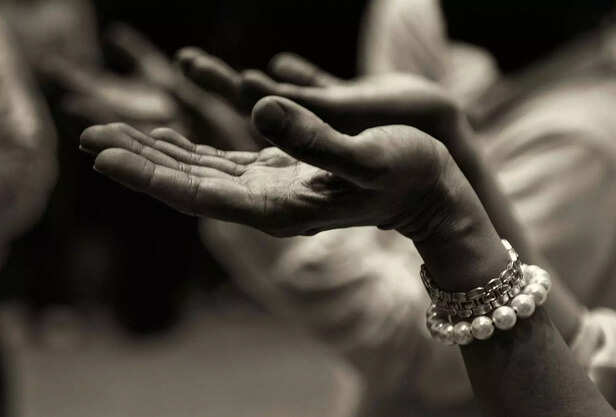When the Gita Says ‘Abandon All Religions’ - What It Actually Means
Riya Kumari | Jun 27, 2025, 22:48 IST
When Krishna says, “Abandon all religions,” he’s not dismissing the path. He’s dissolving the distance between seeker and sought. He’s asking you to stop following truth like it’s somewhere far ahead—and start living it like it’s already within you. This is not a call to rebellion. It’s a call to responsibility.
There’s a moment in the Bhagavad Gita where Krishna drops a line that sounds like it could undo everything you ever believed about religion: “Sarva dharman parityajya…” — Abandon all religions. It hits like a whisper that somehow echoes. And if you stop at the surface, it can feel shocking. Almost sacrilegious. But if you listen closely—not just with your ears, but with the part of you that’s tired of performing and hungry to understand—you realize something: This isn’t a rejection. It’s a revelation.

Let’s be honest: we often treat religion like an identity badge. It gives us structure, stories, language, rules. It gives us belonging. And that’s not just okay—it’s necessary. Religion is a way to begin the journey inward. But the Gita is not about beginning. It’s about becoming. And what Krishna tells Arjuna, after 700 verses of guidance, is this: Once you’ve used the map, it’s time to walk the land without needing it in your hand.
That’s what “abandon all religions” means. It’s the point where the bridge has served its purpose—and now it’s time to stand on your own soul.

Krishna isn’t asking us to disrespect the paths that brought us here. He’s saying: don’t cling. Don’t reduce the divine to rituals alone. Don’t make devotion into a checklist. Because truth, in its highest form, isn’t found in repetition. It’s found in realization. When we blindly hold onto form, we forget the formless.
When we obsess over method, we forget meaning. And when we make the path more important than the destination—we stop walking.

To “abandon all religions” isn’t to become irreligious. It’s to become fearless. It’s to move from obedience to awareness. From fear-based faith to conscious surrender. This isn’t easy. We hold onto systems because they feel safe. But safety isn’t the same as freedom. Krishna is pointing to a truth that many will resist their whole lives: At some point, your relationship with God must stop being borrowed—and start becoming personal.
You must stop being told what the truth is. And start living it, from the quiet authority of your own knowing.

Here’s the paradox: only those who are truly devoted can let go. Because they understand that love doesn't mean possession. It means presence. You can still chant, still visit temples, still light your diya at dawn. But if you’re doing it because you have to—not because your soul moves that way—you’ve turned sacredness into routine. To abandon in the Gita is not to reject. It is to release.
Release the need to control. Release the fear of getting it wrong. Release the belief that God lives only inside certain words, forms, or traditions.
One thing: surrender. Not the kind that’s dramatic and poetic. The kind that’s quiet. Mature. Full of trust. Krishna ends the Gita not with commandments, but with a nudge toward inner authority: “Give up all duties and surrender unto Me alone.” He’s saying: you’ve heard enough. You’ve asked enough. Now live. Live not in confusion, but in clarity. Live not in labels, but in love. We don’t grow by rejecting the path that led us here. We grow by outgrowing it, with gratitude.
“Abandon all religions” isn’t a rebellion. It’s a homecoming. Because the destination of every spiritual path is the same: To realize that the divine was never outside you. It was always here—Waiting for you to stop searching And start being.
Religion Is a Bridge, Not the Shore

Truth
( Image credit : Pexels )
Let’s be honest: we often treat religion like an identity badge. It gives us structure, stories, language, rules. It gives us belonging. And that’s not just okay—it’s necessary. Religion is a way to begin the journey inward. But the Gita is not about beginning. It’s about becoming. And what Krishna tells Arjuna, after 700 verses of guidance, is this: Once you’ve used the map, it’s time to walk the land without needing it in your hand.
That’s what “abandon all religions” means. It’s the point where the bridge has served its purpose—and now it’s time to stand on your own soul.
Letting Go Is Not the Same as Turning Away

Spiritual
( Image credit : Pexels )
Krishna isn’t asking us to disrespect the paths that brought us here. He’s saying: don’t cling. Don’t reduce the divine to rituals alone. Don’t make devotion into a checklist. Because truth, in its highest form, isn’t found in repetition. It’s found in realization. When we blindly hold onto form, we forget the formless.
When we obsess over method, we forget meaning. And when we make the path more important than the destination—we stop walking.
The Courage to Walk Without Crutches

Walk
( Image credit : Pexels )
To “abandon all religions” isn’t to become irreligious. It’s to become fearless. It’s to move from obedience to awareness. From fear-based faith to conscious surrender. This isn’t easy. We hold onto systems because they feel safe. But safety isn’t the same as freedom. Krishna is pointing to a truth that many will resist their whole lives: At some point, your relationship with God must stop being borrowed—and start becoming personal.
You must stop being told what the truth is. And start living it, from the quiet authority of your own knowing.
Devotion Without Dependency

Devotion
( Image credit : Pexels )
Here’s the paradox: only those who are truly devoted can let go. Because they understand that love doesn't mean possession. It means presence. You can still chant, still visit temples, still light your diya at dawn. But if you’re doing it because you have to—not because your soul moves that way—you’ve turned sacredness into routine. To abandon in the Gita is not to reject. It is to release.
Release the need to control. Release the fear of getting it wrong. Release the belief that God lives only inside certain words, forms, or traditions.
So What Do We Hold Onto?
One thing: surrender. Not the kind that’s dramatic and poetic. The kind that’s quiet. Mature. Full of trust. Krishna ends the Gita not with commandments, but with a nudge toward inner authority: “Give up all duties and surrender unto Me alone.” He’s saying: you’ve heard enough. You’ve asked enough. Now live. Live not in confusion, but in clarity. Live not in labels, but in love. We don’t grow by rejecting the path that led us here. We grow by outgrowing it, with gratitude.
“Abandon all religions” isn’t a rebellion. It’s a homecoming. Because the destination of every spiritual path is the same: To realize that the divine was never outside you. It was always here—Waiting for you to stop searching And start being.
